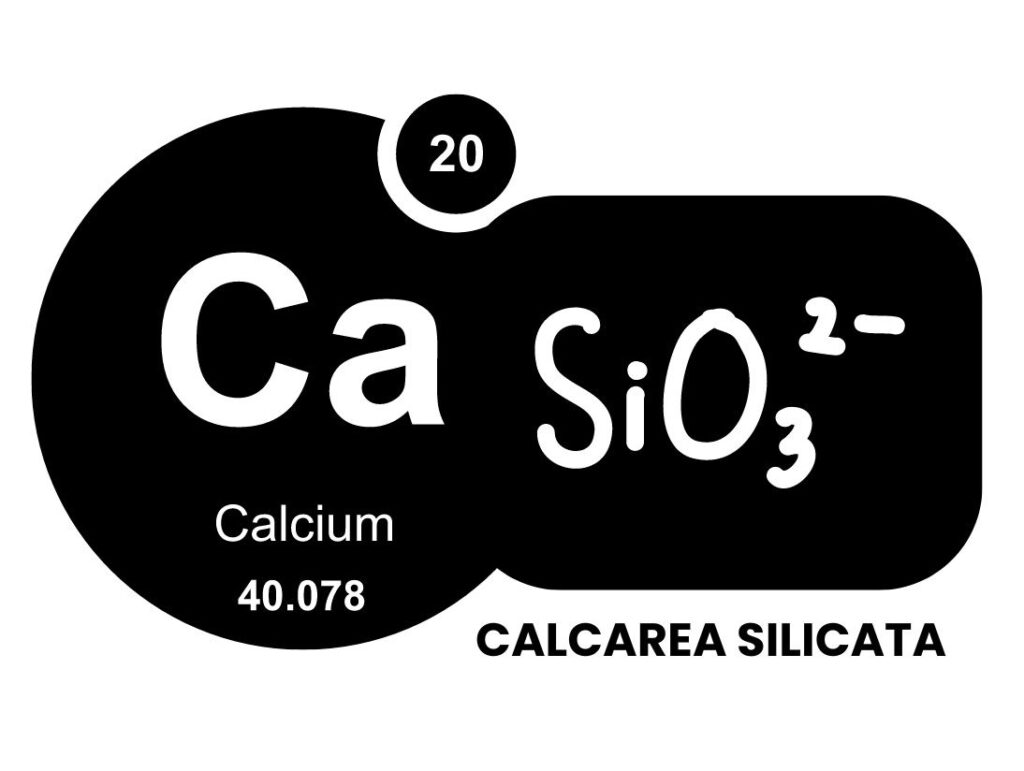Calcarea Silicata, commonly known as Silicate of Lime, is a deep-acting homeopathic remedy used to treat chronic, slow-developing conditions.
t is particularly helpful for individuals who are sensitive to cold and suffer from conditions that worsen over time, like respiratory problems, skin disorders, and general weakness.
It has a long-lasting effect on the body, gradually improving symptoms that have developed slowly and over extended periods.

Table of Contents
ToggleSOURCE INFORMATION
Scientific Classification
- Kingdom: Mineral
- Class: Silicates
- Chemical Formula: CaSiO₃ (Calcium Silicate)
- Common Names: Silicate of Lime, Calcarea Silicata
Origin and Source
Calcarea Silicata is a mineral-derived remedy in homeopathy, sourced from calcium silicate, a compound that naturally occurs in minerals and rocks.
This compound is a silicate form of calcium, often found in the earth’s crust, and plays a significant role in various natural processes.
- Geological Presence: Calcium silicate occurs naturally in minerals like wollastonite and is also present in igneous, metamorphic, and sedimentary rocks.
- It is found in various regions, especially in areas with high geological activity, like mountain ranges and volcanic formations.
- Industrial Use: In addition to its natural occurrence, calcium silicate has been synthesized for use in various industries, including construction materials (like insulation) and ceramics due to its heat-resistant properties.
Historical Facts
- Homeopathic Introduction: Calcarea Silicata was introduced into homeopathic practice based on its association with both Calcium and Silica, two highly influential mineral remedies in homeopathy.
- Dr. Samuel Hahnemann, the founder of homeopathy, laid the groundwork for using minerals like calcium and silica for chronic ailments.
- Calcarea Silicata combined both to create a deeper acting remedy for constitutional and long-term diseases.
- Remedy Development: Over time, homeopaths noticed that Calcarea Silicata remedies acted effectively on patients with slow-developing conditions, especially those involving weak constitutions, bone issues, and immune system deficiencies.
DRUG PATHOGENESIS
- Calcarea Silicata has a hydrogenoid constitution, meaning it is suited to individuals who are highly sensitive to moisture and cold.
- Its therapeutic action is best observed in complaints that evolve slowly, such as long-standing respiratory issues, chronic weakness, and skin diseases that worsen over time.
- The remedy is slow-acting but brings about long-lasting relief by addressing deep-seated health issues.
PHYSICAL CONSTITUTION
Patients requiring Calcarea Silicata are often:
- Weak and emaciated, meaning they suffer from muscle and weight loss.
- Cold and chilly, feeling cold even in warm environments.
- Prone to slow development of diseases that gradually get worse over time.
- It is particularly indicated for individuals who lack vitality and experience atrophy, especially children.
DIATHESIS
- Tubercular Diathesis: Calcarea Silicata is indicated in patients with a tendency towards tuberculosis, or those who have a family history of the condition.
- This diathesis manifests as weakness in the respiratory system, making them prone to chronic colds, coughs, and chest infections.
- Scrofulous Tendencies: A predisposing factor for conditions related to the lymphatic system, such as swollen glands and enlarged tonsils, commonly seen in childhood illnesses.
TEMPERAMENTS
- Sensitive and Irritable: Patients are easily bothered by external factors like cold air or noise.
- Fearful and Lacking Confidence: They tend to suffer from low self-esteem, often doubting their abilities.
- Absent-minded: There is a noticeable difficulty in maintaining concentration or focus.
THERMAL STATE
Calcarea Silicata patients are extremely sensitive to cold and often feel chilly, but they can also feel worse from being overheated.
This paradoxical sensitivity reflects their vulnerability to both cold and heat.
Cold Sensitivity
- Cold aggravates symptoms: Patients tend to feel worse in cold environments, with their conditions often worsening when exposed to cold air or cold weather.
- Cold at the extremities: They may experience cold hands, feet, or other parts of the body, even when the overall temperature is comfortable.
- Desire for warmth: Patients prefer warmth and tend to seek out warmer environments to relieve their symptoms, especially for comfort.
Heat Sensitivity
- Worse from overheating: While the patient feels cold, they also worsen if they become overheated.
- Sweating or being in overly warm environments can make them uncomfortable and exacerbate certain symptoms.
Hydrogenoid Constitution
This specific term indicates a tendency for the patient to be sensitive to moisture and damp conditions, which often worsens their overall state.
Therefore, cold and damp conditions can be particularly troubling for Calcarea Silicata individuals.
Summary:
Calcarea Silicata patients are chilly individuals who are sensitive to both cold and heat, with a strong inclination to feel worse in cold environments, but they also struggle when they become overheated.
They seek a balanced, warm, and dry environment for comfort.
MIASM
Calcarea silicata is primarily associated with both the sycotic and tubercular miasms.
Sycotic Miasm
- The sycotic miasm is characterized by overgrowths, chronic inflammation, and a tendency toward excessive formation, such as warts, tumors, or other growths.
- Calcarea silicata fits this miasm due to its tendency to address conditions like abscesses, suppuration (pus formation), and glandular swellings.
- These conditions show an excess in tissue response, typical of the sycotic miasm.
- It also helps with conditions where the body fails to expel infection fully, leading to chronic conditions or the recurrence of infections, indicative of the sycotic miasmatic state.
Tubercular Miasm
- The tubercular miasm is associated with chronic infections, emaciation, wasting, weakness, and a feeling of being trapped or suffocated, often manifesting as respiratory conditions or recurring infections.
- Calcarea silicata also shows tubercular tendencies because it is used in people with poor immunity, recurring infections, and a tendency toward chronic pus formation.
- These individuals often have weakened constitutions and are prone to wasting conditions, which align with the tubercular miasm.
- The remedy is used for people with a weak constitution, prone to chronic colds, respiratory infections, and general debility.
Summary
Sycotic miasm: Related to chronic abscesses, glandular swellings, excessive pus formation, and overgrowths.
Tubercular miasm: Associated with chronic infections, poor immunity, weakness, and a tendency toward wasting and recurring illness.
Calcarea silicata works well in addressing the chronic, recurring infections, and tissue growths that reflect these miasms.
KEY CHARACTERISTICS
- Sensitivity to Cold: The patient cannot tolerate cold weather, particularly cold air, which worsens respiratory and skin conditions.
- Slow, Gradual Complaints: Conditions like respiratory and skin diseases develop slowly but continue to worsen without treatment.
- Chronic Weakness and Emaciation: Patients often feel weak, have a low appetite, and may experience weight loss.
MIND SYMPTOMS OF CALCAREA SILICATA
ABSENT-MINDEDNESS

- Description: The patient frequently struggles with concentration and is prone to forgetting details, tasks, or conversations.
- Their mind often feels “elsewhere,” making it hard for them to stay present or focused on their activities.
Psychological Causes
- Mental Fatigue: Chronic conditions can lead to fatigue that impacts cognitive functioning.
- Over time, the brain’s ability to focus diminishes, leading to absent-mindedness.
- Chronic Anxiety: Constant worry and fear (common in Calcarea Silicata patients) can lead to distractions and a scattered mind.
- The mental energy is often directed toward fears or internal conflicts, making it harder to concentrate on daily tasks.
- Overthinking: Individuals may be so preoccupied with potential dangers, insecurities, or concerns about their health that their ability to focus on the present weakens.
IRRITABILITY

- Description: Patients are easily irritated and quick to anger, especially when things don’t go as planned or when they face unexpected challenges.
- The irritability may seem out of proportion to the situation.
Psychological Causes
- Internal Tension: The patient’s unresolved fears, insecurities, and anxieties build up as internal tension.
- This tension often manifests as irritability when minor disruptions occur, especially in situations where they feel out of control.
- Lack of Mental Energy: Ongoing chronic conditions, like physical weakness and sensitivity to cold, lead to both physical and mental exhaustion.
- This exhaustion reduces emotional resilience, making the patient more prone to snap at minor frustrations.
- Frustration from Limitations: Since Calcarea Silicata patients often have chronic illnesses and sensitivity to cold, they may feel limited in their ability to perform daily activities.
- This leads to frustration, which can easily trigger irritability when they cannot meet their own or others’ expectations.
IRRESOLUTE AND LACKS CONFIDENCE

- Description: The patient has difficulty making decisions and often second-guesses their choices.
- They lack confidence in their abilities and may rely on others for reassurance.
Psychological Causes
- Low Self-esteem: The chronic physical ailments and long-standing conditions of weakness may erode the patient’s sense of self-worth.
- Over time, they develop a belief that they are incapable of handling challenges, leading to indecisiveness.
- Fear of Failure: This lack of confidence often stems from a deep-seated fear of making mistakes or wrong decisions.
- The patient may worry about negative consequences, leading to hesitation and an inability to commit to decisions.
- Overwhelmed by Choices: The constant burden of managing chronic illness may make even small decisions seem overwhelming.
- When the mind is preoccupied with health concerns, the capacity to make clear and confident choices diminishes.
FEARFUL

- Description: The patient is prone to irrational fears and worries about their health, safety, or future.
- These fears may seem exaggerated or not based on actual threats but still cause significant mental distress.
Psychological Causes
- Health Anxiety: Chronic health conditions make the patient hyperaware of bodily sensations and possible health problems.
- This heightened awareness leads to a constant fear that something is wrong with their body, even if no immediate danger is present.
- Generalized Anxiety: The mental state of the Calcarea Silicata patient is often frail, with a tendency to worry excessively about all aspects of life.
- These fears may include irrational concerns about safety, social judgment, or the well-being of loved ones.
- Fear of the Unknown: Patients may experience an overwhelming sense of vulnerability due to their chronic illnesses.
- Since their health issues develop slowly, they may fear that their condition will worsen unexpectedly, leading to a constant sense of impending doom.
HOW THESE SYMPTOMS INTERCONNECT
- These mental symptoms are often interconnected and can reinforce each other.
- For example, a lack of confidence may lead to absent-mindedness because the individual is constantly questioning their choices.
- Irritability might stem from fearful thoughts, where the patient is anxious about their future or health and feels frustrated by their inability to control these aspects.
- The combination of these symptoms creates a state of mental unrest, making it difficult for the patient to feel grounded and secure in their daily life.
PSYCHOLOGICAL OVERVIEW
- The mental symptoms of Calcarea Silicata patients can often be traced back to a deep feeling of vulnerability due to their physical limitations.
- The fear of worsening health, combined with an inability to cope effectively, creates a vicious cycle of anxiety, irritability, and lack of confidence.
- Patients tend to withdraw, avoid making decisions, and overreact to minor inconveniences due to an internal sense of helplessness.
- This makes the remedy particularly suited for individuals who feel burdened by the slow but progressive nature of their illnesses.
DETAILED ORGAN SYMPTOMS
HEAD
- Vertigo: Patients experience dizziness, especially when exposed to cold air.
- Cold Sensation at the Vertex: A cold feeling on the top of the head, as though the head is exposed to cold wind.
- Catarrh: Chronic nasal discharge that is thick, yellow, and forms hard crusts, particularly in the back of the nose.
STOMACH
- Sensation of Coldness: The stomach feels cold, especially when it is empty.
- Flatulence and Distention: After meals, patients feel bloated and gassy, leading to discomfort.
- Vomiting and Eructations: There may be nausea with vomiting and frequent burping.
FEMALE
- Prolapsed Uterus: A heavy sensation in the uterus, often accompanied by prolapse.
- Leucorrhoea: Painful vaginal discharge that occurs irregularly.
- Menstrual Irregularities: Painful, irregular menstruation, with flow occurring between periods.
RESPIRATORY
- Sensitive to Cold Air: Cold air worsens the cough and breathing difficulties.
- Chronic Airway Irritation: Persistent coughing due to irritation in the air passages, often with thick, yellow-green mucus.
- Chest Pain: Patients feel pain in the chest, particularly in the chest walls, which worsens in cold air.
SKIN
- Cold, Blue Skin: The skin appears cold and may turn bluish in color.
- Itching and Burning: Persistent itching and burning sensations, with sensitivity to cold.
- Psoric Eruptions: Skin conditions resembling psoriasis, with pimples and comedones (blackheads) common.
MODALITIES
- Worse: Cold air, exposure to damp conditions, and physical exertion.
- Better: Warm, dry environments; moderate movement; and gentle warmth.
WHAT ARE MODALITIES IN HOMOEOPATHY?
RELATIONSHIP WITH OTHER DRUGS
Compare with,
- Arsenicum Album: Both remedies treat weakness and emaciation but differ in modalities.
- Tuberculinum: Similar in its effects on respiratory conditions.
- Baryta Carbonica: Used for chronic weakness and sluggish development in children, similar to Calcarea Silicata.
- Iodum: Both are used for conditions involving chronic emaciation and fatigue.
DOSE
- Calcarea Silicata can be used in low to high potencies, depending on the severity and duration of the symptoms.
- It is usually prescribed by a homeopathic practitioner based on individual needs.
Frequently Asked Questions
What is Calcarea Silicata used for?
- It is primarily used for treating chronic, slow-developing conditions, such as respiratory issues, skin disorders, and general weakness.
Who can benefit from Calcarea Silicata?
- Patients who are highly sensitive to cold and suffer from long-standing, gradually worsening ailments.
How should Calcarea Silicata be taken?
- It should be taken as prescribed by a homeopathic practitioner.
- The dosage depends on the severity of the condition and the individual patient’s constitution.
What are the key symptoms that indicate the need for Calcarea Silicata?
- Cold sensitivity, chronic cough, slow-developing diseases, emaciation, and skin problems like psoriasis or acne.
Glossary
- Emaciated: Extremely thin or weak, usually due to illness or lack of nutrition.
- Catarrh: Excessive buildup of mucus in the nasal passages or throat.
- Prolapsed Uterus: A condition where the uterus slips from its normal position.
- Leucorrhoea: Vaginal discharge that may be white or yellow in colour.
- Hydrogenoid Constitution: A physical condition that makes one sensitive to moisture and dampness.
- Psoric Eruptions: Skin eruptions similar to those seen in psoriasis.
